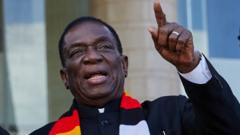Prime Minister Netanyahu's coalition moves forward with judicial overhaul, drawing protests and concerns over politicization of the judiciary.
Israeli Parliament Expands Political Control Over Judicial Appointments

Israeli Parliament Expands Political Control Over Judicial Appointments
New legislation empowering Israeli lawmakers to select judges sparks renewed controversy amid ongoing conflict with Hamas.
In a controversial legislative move, Israeli lawmakers under Prime Minister Benjamin Netanyahu have enacted new laws that increase political influence over the selection of judges, as part of a sweeping effort to overhaul the country's judiciary. This significant development follows a series of political strife prior to the resurgence of violence in Gaza.
On Thursday morning, the Israeli Knesset, Israel's 120-seat Parliament, passed two key pieces of legislation after an extended debate that was largely marked by opposition boycotts. Critics of the laws argue that they will introduce political bias into the judiciary by changing how judges, including those on the Supreme Court, are chosen.
This decision signals a revival of Netanyahu's two-year campaign to bolster his coalition's power across governmental branches, a campaign that had previously been put on hold due to the chaos surrounding the conflict with Hamas. Though the recent measures are not as drastic as earlier proposals which faced widespread public protests, they are poised to reignite tensions that have been simmering since before the outbreak of hostilities in October 2023.
Protests erupted outside the Knesset as demonstrators expressed their discontent with the new moves, waving Israeli flags and voicing demands for an immediate ceasefire and talks to secure the release of hostages held by Hamas. Inside the Parliament, Netanyahu addressed his supporters, claiming that these measures aim to counter an unelected "deep state," language that resonates with certain political narratives found within other global contexts.
The new laws reflect a complex political landscape as Israel navigates its ongoing conflict with Hamas, highlighting the intertwined nature of governance and judiciary reform amidst a backdrop of war and public dissent.
On Thursday morning, the Israeli Knesset, Israel's 120-seat Parliament, passed two key pieces of legislation after an extended debate that was largely marked by opposition boycotts. Critics of the laws argue that they will introduce political bias into the judiciary by changing how judges, including those on the Supreme Court, are chosen.
This decision signals a revival of Netanyahu's two-year campaign to bolster his coalition's power across governmental branches, a campaign that had previously been put on hold due to the chaos surrounding the conflict with Hamas. Though the recent measures are not as drastic as earlier proposals which faced widespread public protests, they are poised to reignite tensions that have been simmering since before the outbreak of hostilities in October 2023.
Protests erupted outside the Knesset as demonstrators expressed their discontent with the new moves, waving Israeli flags and voicing demands for an immediate ceasefire and talks to secure the release of hostages held by Hamas. Inside the Parliament, Netanyahu addressed his supporters, claiming that these measures aim to counter an unelected "deep state," language that resonates with certain political narratives found within other global contexts.
The new laws reflect a complex political landscape as Israel navigates its ongoing conflict with Hamas, highlighting the intertwined nature of governance and judiciary reform amidst a backdrop of war and public dissent.




















